In this edition of Court judgements review, we look at Allahabad HC’s ruling that marital rape is an offence only if the wife is aged below 18 years, Delhi HC’s order that a wife is entitled to maintenance even if she is capable of earning and taking care of herself, Bombay HC’s order that it is duty of the driver to take proper precautions when a vehicle is stationed on the road, among others.
Allahabad HC: Marital rape is an offence only if the wife is aged below 18 years
In 2013, Sanjeev Gupta’s wife filed a case against him at a police station in Ghaziabad, accusing him of cruelty, violence and offenses related to insults, sexual acts, and dowry-related matters. The case was registered under sections 498A, 323, 504 and 377 of the IPC and the Dowry Prohibition Act as well. The trial court found him guilty and convicted him under the aforesaid sections. He then filed an appeal, in which, the appellate court also upheld the trial court’s findings. He then filed the revision petition before the Allahabad High Court.
Justice Ram Manohar Narayan Mishra of the Allahabad High Court noted that there were no mistakes in the factual or legal aspects of the guilty verdict given by the higher court concerning the charges under sections 323 and 498-A of the IPC. However, concerning the conviction related to section 377 of the IPC, the court stated that the country has not made marital rape a criminal offense, yet. The appellant was acquitted of the charges under section 377 of IPC in this backdrop. Referring to the ‘Independent Thought vs Union of India’ case ruling from 2017 of the Supreme Court, the High Court stated that any sexual activity between a man and his wife, where the wife is aged between 15 and 18 years, would be considered as rape.
It also referred to the Madhya Pradesh High Court’s decision that Section 375 IPC includes all possible parts of penetration of the penis and that the consent for such an act is immaterial, leaving no scope for the offence of Section 377 IPC to get attracted where husband and wife are involved in sexual acts. The Bench also noted that the proposed Bhartiya Nyay Sanhita, which is likely to replace the Indian Penal Code, has no provision for section like 377 of the IPC.
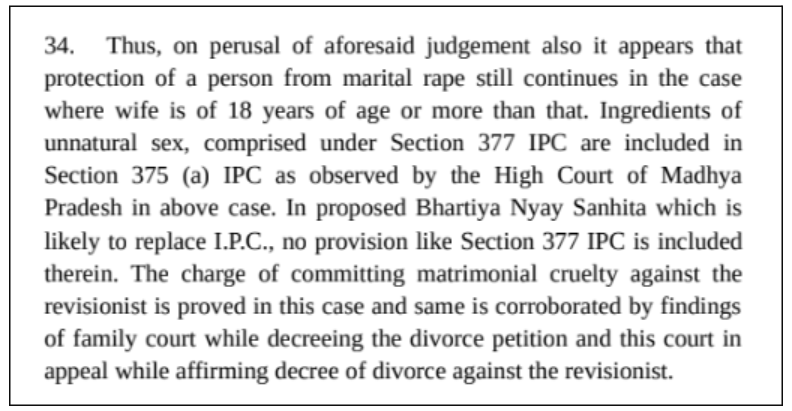
Delhi HC: Wife is entitled to maintenance even if she is capable of earning and taking care of herself
In Nidhi Sudan vs. Manish Kumar Khanna, the appellant had filed for divorce on grounds of cruelty and desertion, along with an application for maintenance under Section 24 of the Hindu Marriage Act. Initially, the respondent was willing to mutually consent to divorce but later remained absent from proceedings, leading to the ex-parte proceeding. The appellant had an MBA and LLB qualification and had a monthly income from her business and rental property. She sought maintenance of Rs. 75,000 per month along with litigation expenses.
The appellant approached the Delhi High Court dissatisfied with the decision of the Family Court. The Family Court said that the wife did not require financial support as she had her income. The husband, who was a lawyer, was asked to pay only Rs. 20,000 per month for their child’s expenses since both parents were responsible. The wife was also given Rs. 11,000 for legal costs.
The High Court Bench of Justice V Kameswar Rao and Justice Anoop Kumar Mendiratt mentioned that legally, the responsibility for providing financial support rests more heavily on the husband than the wife. This is because laws regarding maintenance for women and children, found in different statutes, align with the principle outlined in Article 15(3) of the Indian Constitution. Though the court highlighted that both parents share the responsibility for the child’s support, it added that it was important to realistically assess the expenses and the financial situation of both parties. Moreover, the wife is also entitled to enjoy the same amenities of life as she would have been entitled to in her matrimonial home, it noted. On these grounds, the High Court modified the Family Court’s order and ordered that the wife is entitled to monthly maintenance.
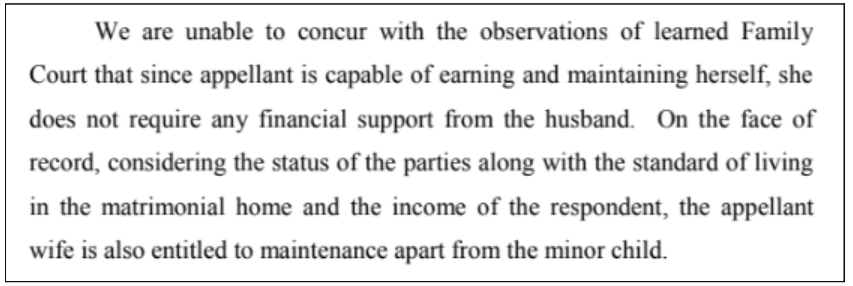
Bombay HC: It is the duty of the driver to take proper precautions when a vehicle is stationed on the road
About two decades ago, in 2003, the deceased was riding his motorcycle toward Chakan at night. Near Sudwadi village, there was a parked truck without lights on the Talegaon Chakan road. As it was dark and the truck had no parking lights, the deceased collided with it from behind, leading to fatal injuries. The Motor Accident Claim Tribunal, Pune, found the deceased 65% at fault and the parked truck’s driver 35% responsible. The claimant Nita Narendra Nadgouda appealed in 2011 seeking more compensation.
In Nita Narendra Nadgouda vs. M/s. Garuda Carriers and Shipping (P) Ltd. and Ors, the appellant contended that the trailer/truck was stationed on the road without putting parking lights on because of which the deceased could not see the vehicle parked on the road. Further, it was also argued that it was the sole negligence of the driver of the truck, but this fact was not considered by the Tribunal.
Justice Shivkumar Dige of the Bombay High Court observed that it was the duty of the driver of the stationary vehicle on the road to turn on parking lights. It attributed 100 percent negligence to the driver of the stationary truck. Citing Rule 109 of the Central Motor Vehicle Rules, 1989, the court highlighted the duty of the driver to take proper precautions when a vehicle is stationed on the road, including the use of parking lights. Moreover, neither the driver nor any witness had been examined to prove that proper care was taken. The court instructed the Insurance Company to deposit the increased amount with 7% yearly interest within four weeks.
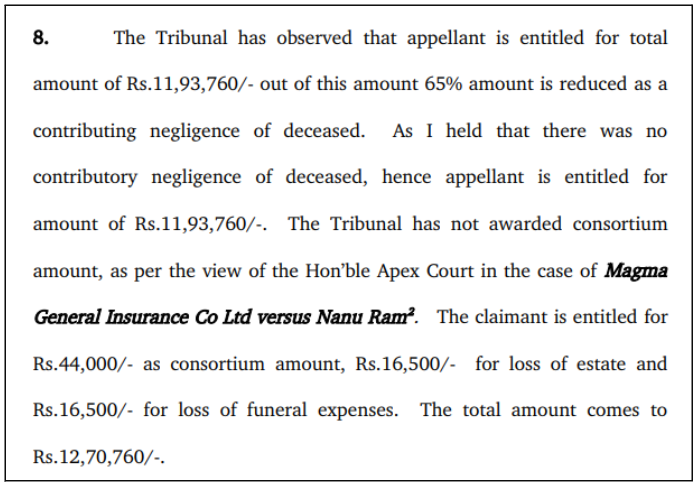
SC: Innocence or undertaking to participate in trial is not valid reason to grant bail
In the State of Jharkhand vs. Dhananjay Gupta, an FIR was registered against the accused under several provisions of IPC, including Section 307 (Attempt to Murder) and Section 27 of the Arms Act (Using arms). The accused was arrested in this regard in 2022 but was granted bail by the High Court in January 2023. In the High Court, the accused claimed innocence and promised to take part in the trial. He argued that there were no specific allegations of wrongdoing against him, and the investigation had been finished.
However, the Supreme Court was dissatisfied with the High Court’s decision. The Division-Judge Bench of Justices C T Ravikumar and PV Sanjay Kumar set aside the High Court’s order and observed that simply asserting innocence or agreeing to participate in the trial is not a valid reason for granting bail to an accused in such serious offences.
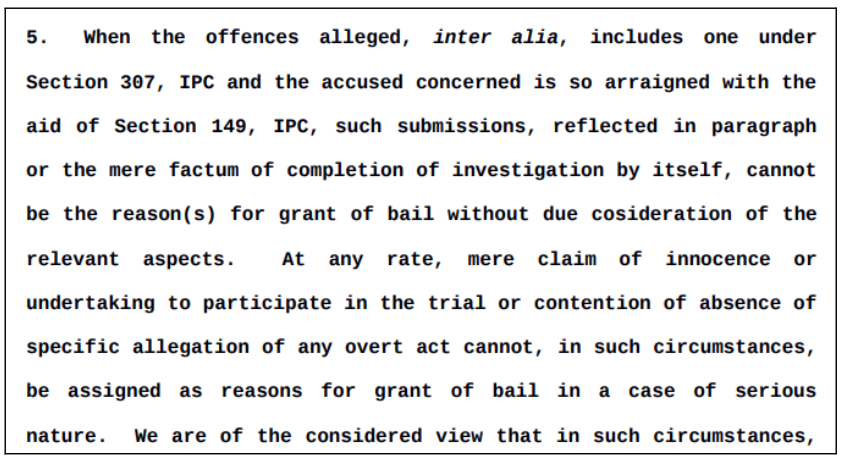
SC: Treating one position differently, despite the same rules being applicable for all, violates the established norms
In Dr PN Shukla vs. Union of India, the first appellant initially joined the Commission for Scientific and Technical Terminology (CSTT) as a Research Assistant in 1990 and was later promoted to Scientific Officer in 1997. The recruitment was made in terms of the Central Hindi Directorate (Research Assistant) Recruitment Rules, 1980 which were later amended in 1993. In 1994, appellants No.2 to 6 joined CSTT as Research Assistants. The first appellant was promoted to Scientific Officer in 1997. A common seniority list was circulated in 1999, with appellants No.2 to 6 placed at various positions and respondent No.4 at Serial No.13.
Then, respondent No.4 sought a pay-scale upgrade in 2000, but the request was rejected in 2001. Later, when appellants No.2 to 6 were promoted as Assistant Scientific Officers from 2002 to 2006, respondent No.4 left CSTT and pursued a career in Ayurvedic medicine, joining various organizations. In 2006, an order was issued by the Directorate upgrading his payscale from ₹6500-10500 to ₹8000-13500 referencing a Commission report which dealt with the pay scales of doctors. The post of Assistant Scientific Officer (Medicine) was equated with that of a doctor. Even though respondent No.4 was not practicing as a doctor in CSTT, he was granted a higher pay scale. An order in 2007 declared the post of Assistant Scientific Officer (Medicine) as ex-cadre, which aggrieved the appellants.
The appellants wanted the same pay scale and benefits as respondent No.4 since they all followed the same rules and had similar roles. They even filed an application in 2009 requesting this, but it was rejected in 2010, and their review was also turned down. They filed a Writ Petition in the High Court, which was dismissed by the Division Bench, following which they approached the Supreme Court.
The Supreme Court Bench of Justices Rajesh Bindal and Hima Kohli observed that upon joining as a Research Assistant, respondent No. 4 pursued deputations to various organizations. The Court opined that the respondent was not interested in serving his parent organisation but was more interested in getting a higher pay scale while going on deputation.
The Bench clearly stated that treating one post preferentially, despite all positions being governed by the same rules, went against established norms. It added that if governed by the same set of Rules, a single post of the same cadre could not have been isolated and granted a higher pay. Calling it an act of favouritism, the Court cancelled the orders justifying those benefits to respondent no.4, didn’t grant the same pay to the appellants, and instructed the authorities to recover the extra amount paid to respondent No. 4 due to this mistake.
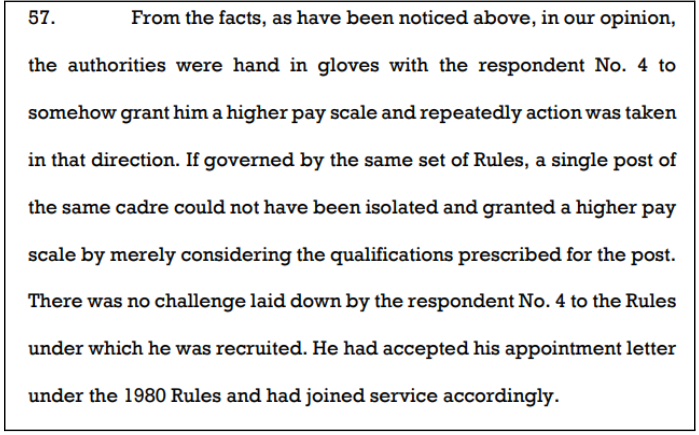
SC: Presidential orders are constitutionally valid for abrogation of Article 370
In Re Article 370 of the Constitution of India, the Supreme Court considered a series of petitions questioning the legality of the abrogation of Article 370 revoking the special status granted to Jammu and Kashmir and bifurcating the state into two separate union territories- Jammu and Kashmir, and Ladakh. In the 476-page long judgement, the Constitution Bench of the Supreme Court led by Chief Justice of India DY Chandrachud upheld the constitutional validity of the Jammu and Kashmir Reorganisation Act 2019, specifically affirming the creation of the Union Territory of Ladakh from the former State of Jammu and Kashmir.
The bench upheld the constitutional validity of the two presidential orders and added that Article 370 was held to be a temporary provision on a historical reading, as per which it was a transitory and temporary provision. Justice Sanjay Kishan Kaul recommended that a Truth and Reconciliation Commission should be set up in Jammu and Kashmir to investigate and report on the violation of human rights both by State and non-state actors perpetrated in Jammu & Kashmir at least since the 1980s and recommend measures for reconciliation.


